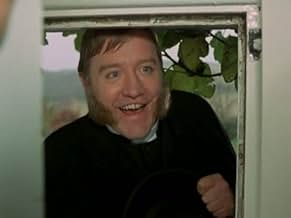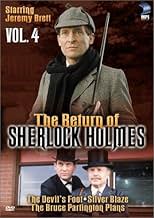While convalescing in Cornwall, a depressive Holmes investigates the apparent death from apoplexy of a local woman and the unexplained sudden dementia of her two brothers.While convalescing in Cornwall, a depressive Holmes investigates the apparent death from apoplexy of a local woman and the unexplained sudden dementia of her two brothers.While convalescing in Cornwall, a depressive Holmes investigates the apparent death from apoplexy of a local woman and the unexplained sudden dementia of her two brothers.
- Policeman in House
- (uncredited)
Featured reviews
While not the best of the series it certainly stands out as one of the better ones and is infinitely better than some other Holmes adaptations we have been subjected to in the past decades. An original and classic Sherlock Holmes story is not so much about a detective solving a murder case. We are not talking whodunnit here. People who are looking for that sort of thing had better look out for the odd Agatha Christie movie. A Holmes story is mostly about atmosphere, be it the foggy, nostalgic, and mysterious atmosphere of Victorian London, or, in this case, the lonesome, mystic and eerie air of the Cornish countryside.
Anyone who is slightly acquainted with the canon of Sherlock Holmes stories will know that all occurrences have a scientific and logical explanation. So there is no reason to dwell unnecessarily long on the possibility of something supernatural happening. Of course the astute viewer will have identified the criminal rather early but contrary to the plots of classic whodunnits some of the best Holmes stories feature a criminal who only appears towards the end of the story and is usually some strange and outlandish character from the victim's past. In a whodunnit we would resent such a solution but in a Holmes story which is mostly about atmosphere we do not.
As always, the production values are superb. The sets and costumes are meticulous, the photography is skillful and the atmosphere is resolutely creepy and mysterious. Coupled with one of the most haunting music scores of the series(gives The Red Circle a run for its money), fine sophisticated writing, good pacing, great direction and a classic story told in such an adept way you have a superb episode.
And I cannot not mention the acting. Jeremy Brett is a perfect Holmes with a gritty baritone and commanding presence and Edward Hardwicke is more than an ideal contrast as a thoughtful and composed Watson.
Overall, a wonderful episode and adaptation. 10/10 Bethany Cox
A good episode of Sherlock Holmes, though not among the best. The initial perpetrator is fairly obvious and the title of the episode gives away, to a degree, the method.
Still, it's interesting enough and gets quite intriguing once Mortimer is found dead.
There are two mildly interesting things about the episode.
One is the continuing oscillation between supernatural forces and the mechanical logic of life that was popular in Victorian England. These forces pull extremes, even today. This version of the story plays that down. From the very first you know we are dealing with a powdered drug. From the very first you know who did it and why.
The other interesting thing is a continuing issue in film. How do you deal with distortions of reality, like dreams and hallucinations? There seems to be a sort of hack vocabulary for this that TeeVee imposes: some wavy images, threatening situations, blood from skin, short, confusing exposures, jittery camera.
Its done here in the clumsiest of ways. Five years later a more maddened Brett would be in "The Last Vampyre" that was equally bad as a Holmes, but much better in the hallucination department.
Oh and accompanying music that seems to come from only one source. This, my friends is why there will never be a decent Holmes produced for TeeVee. Whenever these choices have to be made, the TeeVee vocabulary is just too hackneyed and ordinary.
Ted's Evaluation -- 1 of 3: You can find something better to do with this part of your life.
Did you know
- TriviaThe scene of Holmes burying his syringe came in reaction to the producers and Jeremy Brett learning that this Sherlock Holmes was very popular with children, who saw him as a superhero. As such, Brett was troubled that Holmes was setting a bad example to that audience with his cocaine usage. In response, he sought and obtained permission from Arthur Conan Doyle's daughter, Dame Jean Doyle and the Doyle estate for permission to have Holmes overcome and abandon his addiction.
- GoofsWhen Holmes questions Dr Sterndale about his motives for giving up his trip to Africa, Dennis Quilley says, "The vicar sent me a telegram recalling me to Tredannick Wollas." In the original story he house is called Tredannick Wartha, but the nearby village is called Tredannick Wollas.
- Quotes
Sherlock Holmes: You went to the vicarage, and you waited there for some time.
Dr. Leon Sterndale: How do you know that?
Sherlock Holmes: I followed you.
Dr. Leon Sterndale: I saw no one!
Sherlock Holmes: That is what you may expect to see when *I* follow you!
- ConnectionsVersion of The Devil's Foot (1921)


















